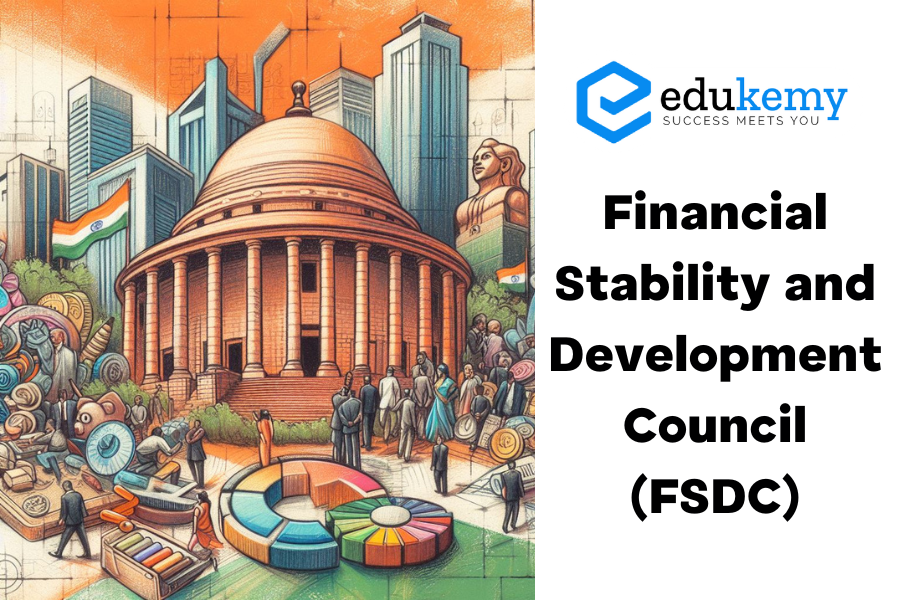
The Financial Stability and Development Council (FSDC) was established in 2010 to address the need for coordinated efforts among various financial regulators in India. It was first proposed by the Raghuram Rajan Committee in 2008, and its creation gained significance in the aftermath of the global economic crisis, which underscored the importance of regulating the financial sector for stability.
Contents
Objectives and Functions:
- Maintaining Financial Stability: FSDC aims to strengthen and institutionalize mechanisms for maintaining financial stability in India. This involves monitoring and addressing risks that could potentially impact the stability of the financial system.
- Financial Sector Development: The council is responsible for promoting the development of the financial sector. This includes fostering innovation, efficiency, and competitiveness within the financial markets.
- Inter-Regulatory Coordination: FSDC facilitates coordination among various financial regulators in the country. This coordination is essential to avoid friction among regulators and ensure a cohesive approach to addressing challenges in the financial sector.
- Macro-Prudential Regulation: The council engages in macro-prudential supervision of the economy. This involves overseeing the overall health and resilience of the financial system, including the functioning of large financial conglomerates.
- Financial Literacy and Inclusion: FSDC plays a role in promoting financial literacy and inclusion initiatives. This involves efforts to enhance awareness and understanding of financial products and services among the public.
- International Coordination: The council coordinates India’s international engagement with financial sector bodies such as the Financial Action Task Force (FATF) and the Financial Stability Board (FSB). This ensures alignment with global standards and practices.
Composition:
The Chairperson of FSDC is the Union Finance Minister, and its members include key figures from various regulatory bodies and government departments:
- Governor, Reserve Bank of India (RBI)
- Finance Secretary or Secretary, Department of Economic Affairs (DEA)
- Secretary, Department of Financial Services (DFS)
- Chief Economic Advisor, Ministry of Finance
- Chairman, Securities and Exchange Board of India (SEBI)
- Chairman, Insurance Regulatory and Development Authority (IRDA)
- Chairman, Pension Fund Regulatory and Development Authority (PFRDA)
- Other members as deemed necessary by the Chairperson
The Joint Secretary (Capital Markets), DEA, serves as the Secretary of the Council.
FSDC plays a crucial role in coordinating and addressing challenges in India’s financial sector, contributing to both stability and development.
FAQs
1. What is the Financial Stability and Development Council (FSDC)?
A: The Financial Stability and Development Council (FSDC) is a high-level body in India chaired by the Finance Minister. It was established in 2010 to strengthen and institutionalize the framework for maintaining financial stability, enhancing inter-regulatory coordination, and promoting financial sector development.
2. What is the primary objective of the FSDC?
A: The primary objective of the FSDC is to ensure financial stability in the Indian economy. It achieves this by coordinating the efforts of various regulatory authorities such as the Reserve Bank of India (RBI), Securities and Exchange Board of India (SEBI), Insurance Regulatory and Development Authority of India (IRDAI), and others.
3. How does the FSDC contribute to financial sector development?
A: FSDC facilitates coordination among regulators to address systemic risks and promote the development of a resilient financial system. It also serves as a platform for discussing and implementing policies to foster innovation, inclusivity, and efficiency in the financial sector.
4. What are the key functions of the FSDC?
A: The key functions of the FSDC include assessing macroeconomic and financial market developments, identifying systemic risks, formulating policies to enhance financial stability, coordinating regulatory actions, and addressing inter-regulatory issues that may arise.
5. How does the FSDC impact the financial landscape of India?
A: The FSDC plays a crucial role in maintaining stability and fostering growth in India’s financial sector. By promoting coordination among regulators and stakeholders, it helps mitigate risks, strengthen resilience, and create an enabling environment for sustainable development and innovation in the financial ecosystem.
In case you still have your doubts, contact us on 9811333901.
For UPSC Prelims Resources, Click here
For Daily Updates and Study Material:
Join our Telegram Channel – Edukemy for IAS
- 1. Learn through Videos – here
- 2. Be Exam Ready by Practicing Daily MCQs – here
- 3. Daily Newsletter – Get all your Current Affairs Covered – here
- 4. Mains Answer Writing Practice – here

